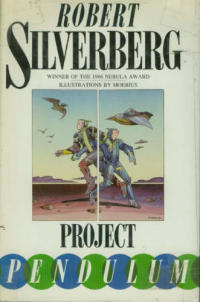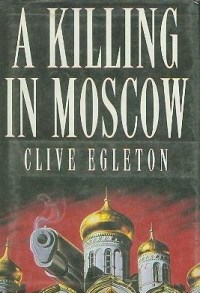Project Pendulum by Robert Silverberg
 Wednesday, December 22, 2010 at 11:40PM
Wednesday, December 22, 2010 at 11:40PM 
Published by Byron Preiss in 1987
Project Pendulum is one of the Millennium series of books published by Byron Preiss. Each book dealt with a different science fiction theme. The subject of Project Pendulum is time travel. The story (really more of a novella or long short story than a novel) is reprinted in Cronos along with two more of Silverberg's time travel stories.
Eric Gabrielson is sent 5 minutes into the past while his twin brother Sean simultaneously moves 5 minutes into the future. Then Eric moves 50 minutes into the future while Sean moves 50 minutes into the past. The next swing of the pendulum sends them each 500 minutes in opposite directions; the swing after that moves them 5000 minutes, and so on. If this first experiment in time travel is successful, the brothers will explore 95 million years in each direction. Silverberg explains the basis for this time displacement in language that sounds reasonable enough to those of us who don't know a singularity from a tachyon particle. Eric doesn't understand it either; he's a paleontologist who is more interested in the past than the mechanics of the journey. Sean, on the other hand, is a physicist.
Each time jump for each brother comprises a chapter. There isn't much of a plot; the book consists of snippets of the past and future. Silverberg's depictions of the unspoiled past are rich with detail. The future scenarios are vividly described and wildly imaginative, although they aren't always explained. This makes sense, since Eric and Sean don't hang around long enough to get explanations of what they see, but it's nonetheless a source of minor frustration. The more significant drawback to telling a story through vignettes is that Eric and Sean are observers more than actors. They don't spend enough time in any era to allow a story to develop beyond their ride on the pendulum: they see this, they see that, they plunge into a sticky situation but are rescued by the next swing of the pendulum. It's an interesting ride and while there's a certain sweetness to the ending, the story is far from absorbing.
Byron Preiss (1953-2005) was known for his efforts to marry the printed text with visual art. The Millennium series furthered that ambition by pairing stories with illustrations. The black and white drawings in Project Pendulum are by the artist Moebius. They didn't excite me but I'm no art critic; all I can say is that there aren't many of them. The hardcover is printed on bright white, heavy, probably acid-free paper, so if you can find a copy, it should last a long time.
RECOMMENDED WITH RESERVATIONS



